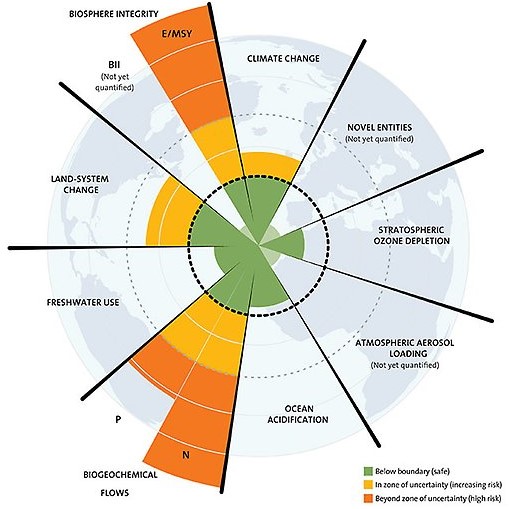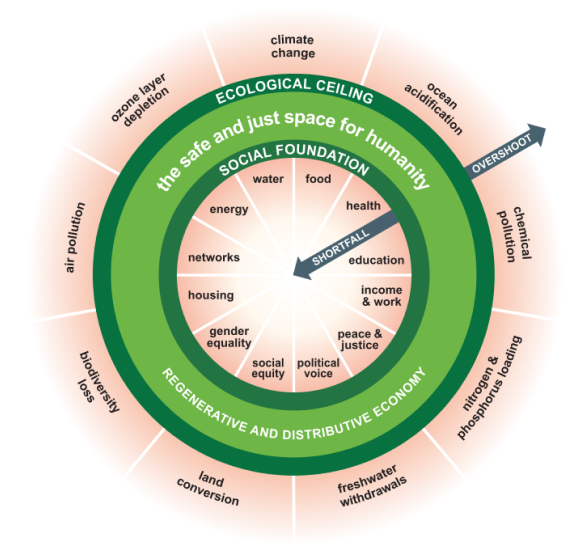
Contents
Economic Growth, Climate Crisis and People’s Well-Being
– MATSUSHITA Kazuo
Professor Emeritus, Kyoto University; Chairman, Japan Society for GNH Studies; Senior Fellow, Institute for Global Environmental Strategies
The “Era of Global Boiling” Has Arrived
On July 27, 2023, United Nations Secretary-General Juan Manuel Guterres stated that “the era of global warming is over and the era of global boiling has arrived”[1]. This was stated at a press conference following the release of official data by the World Meteorological Organization (WMO) and the European Commission’s Copernicus Climate Change Service (C3S) confirming that July will be the hottest month in human history.
The Secretary-General further stated.
“All of this is in perfect agreement with scientists’ predictions and repeated warnings. The only surprise is the speed of change. Climate change is here now. It is frightening. And it is only the beginning.” “It is still possible to limit the global temperature increase to less than 1.5°C and avoid the worst of climate change. But it can only be done through dramatic and immediate climate action. Accelerating temperature rise demands accelerated action. We can still stave off the worst. But to do so, we must turn a year of extreme heat into a year of ambition and accelerate climate action.”
Economic Growth and Human Well-Being
Economic growth since the Industrial Revolution has brought affluence to humanity, absolute poverty has shrunk, human life expectancy has increased, and the population has grown. Economic growth began in developed countries such as Europe and the United States, and since the latter half of the 20th century, economic globalization has spread to developing and middle-developed countries as well. At the same time, rapid population and economic growth have increased CO2 emissions and resource consumption, causing environmental destruction, resource depletion, climate change, loss of biodiversity, and other problems. Today, the Earth’s natural environment is approaching the limits of sustainability, and if left unchecked, the very foundations of human existence may be threatened in the future.
The purpose of economic growth is to increase incomes and enrich people’s lives. But does an increase in income really make people happier? The American economist Easterlin showed that life satisfaction has not improved despite an increase in real per capita income, which is known as the Easterlin Paradox[2]. Many subsequent studies on happiness have revealed that economic growth does not necessarily lead to greater happiness. It is the content of economic growth that is being questioned.
Economic development must operate within the “planetary boundary”[3](Fig 1). This is what British economist Kate Raworth calls the “doughnut economy”[4](Fig 2).
The outer edge of the doughnut-shaped diagram in Figure 2 represents the “ecological ceiling” line where human activities can take place without disrupting the planetary boundaries. On the other hand, the inner circle of the doughnut (the hole in the center) represents the “social foundation” such as food, shelter, education, and income, which is the basis of all human life. The “safe and just space for humanity” is defined as the area between the “ecological ceiling” on the outer edge of the doughnut and the “social foundation” on the inner circle, and economic activities within this range can improve human welfare while securing the social foundation without exceeding the planetary boundaries.
Once this doughnut economy is established, it will be possible to achieve the sustainable and inclusive economic growth and shared prosperity demanded by the SDGs (Sustainable Development Goals) and to create the conditions for rewarding and humane work, taking into account the different development stages and capacities of each country.
What Bhutan’s Gross National Happiness (GNH) implies
Bhutan’s concept of GNH makes it clear that economic growth is not an “end” but a “means” to improve people’s happiness.
Bhutan has adopted GNH as an alternative national goal to Gross National Product (GDP), and utilizes it as a guideline for policy integration in actual administration.
Former King Wangchuck, the fourth king of Bhutan, who advocated GNH, had this to say: “What the people want is happiness. In addition to a minimum level of material wealth, it is important to have family and community ties, harmony between people and nature, history and culture that can be shared by the people.” These are what King Wangchuk described as GNH instead of GDP.
So how can the goal of achieving happiness be reflected in actual political and administrative structures? In Bhutan, GNH is not only a slogan, but also an indicator for its realization, and efforts are being made to institutionalize a concrete policy evaluation process within the government.
According to the GNH Commission, GNH is both a philosophy, an economic theory, and a practical policy objective. GNH as a philosophy that integrates traditional culture and modern science leads to a shift in development priorities, while GNH as an economic theory develops a critique of GDP and focuses on improving the spiritual, physical, and social well-being of people, both quantitatively and qualitatively. GNH as a policy objective articulates detailed priorities and means to achieve sustainable development.
Sustainable development in Bhutan’s National Environmental Strategy is defined as “the policy will and national capacity to maintain today’s development and environment so that future generations do not lose their unique cultural integration, historical heritage, and quality of life. In his speech, the fifth and current King Wangchuk expressed his belief that “GNH bridges the pursuit of economic growth with the fundamental values of kindness, equality, and compassion.”
GNH consists of four pillars: (1) sustainable and equitable socioeconomic development, (2) environmental conservation, (3) cultural promotion, and (4) good governance. These are further divided into nine areas: (1) standard of living, (2) health, (3) education, (4) ecological health, (5) culture, (6) psychological well-being, (7) work-life balance (use of time), (8) community vitality, and (9) good governance.
Based on the GNH approach, policy priorities are being reevaluated and indicators are being developed to quantitatively and qualitatively assess improvements in people’s mental, physical, and social well-being instead of GDP. GNH does not reject indicators such as the Human Development Index or GDP, but recognizes their characteristics and roles, and sees them as complementary.
However, there are many challenges to the sustainability of Bhutan’s economy and environment. New threats such as climate change are becoming a reality, and the consumerist civilization of the modern world will flow into Bhutan relentlessly as a result of globalization and the advancement of information technology, and the traditional values of the Bhutanese people might be changed. Bhutan’s future, as it seeks human and national development under severe natural and geopolitical circumstances, with GNH as its guiding principle and focusing on the welfare and happiness of its people, has much to offer to other countries in terms of considering how to achieve sustainable development and well-being of the people.
[1] https://news.un.org/en/story/2023/07/1139162
[2]https://papers.ssrn.com/sol3/papers.cfm?abstract_id=3743147
[3]https://www.stockholmresilience.org/research/planetary-boundaries.html
[4] https://doughnuteconomics.org/about-doughnut-economics
Profile of Mr. MATSUSHITA
Professor Emeritus of Kyoto University, Senior Fellow of the Institute of Global Environmental Strategies (IGES), Chairman of the Japan Society for GNH Studies. Before holding these positions, worked at several institutions including the Ministry of Environment of Japan, the Environment Directorate of the OECD, United Nations Conference on Environment and Development (UNCED), and as Professor of Global Environmental Policy at the Graduate School of Global Environmental Studies of Kyoto University. Major research areas are sustainability studies as well as climate change policies and global environmental policies from the viewpoint of environmental governance.
His major publications include “The 1.5°C Climate Crisis” (2022), “The Climate Crisis and the Corona Disaster” (2021), “Journey to Global Environmental Studies” (2011), “Recommendations for Environmental Policy Studies” (2007), “Environmental Governance” (2002), “Introduction to Environmental Politics” (2000), “Environment in the 21st Century and New Development Patterns” (2000)

Fig 1 (source: https://www.stockholmresilience.org/research/planetary-boundaries.html)

Fig 2 (source: https://doughnuteconomics.org/about-doughnut-economics)

Thank you for reading. Any comments and suggestions are welcome.
Email us!→info@kfaw.or.jp


